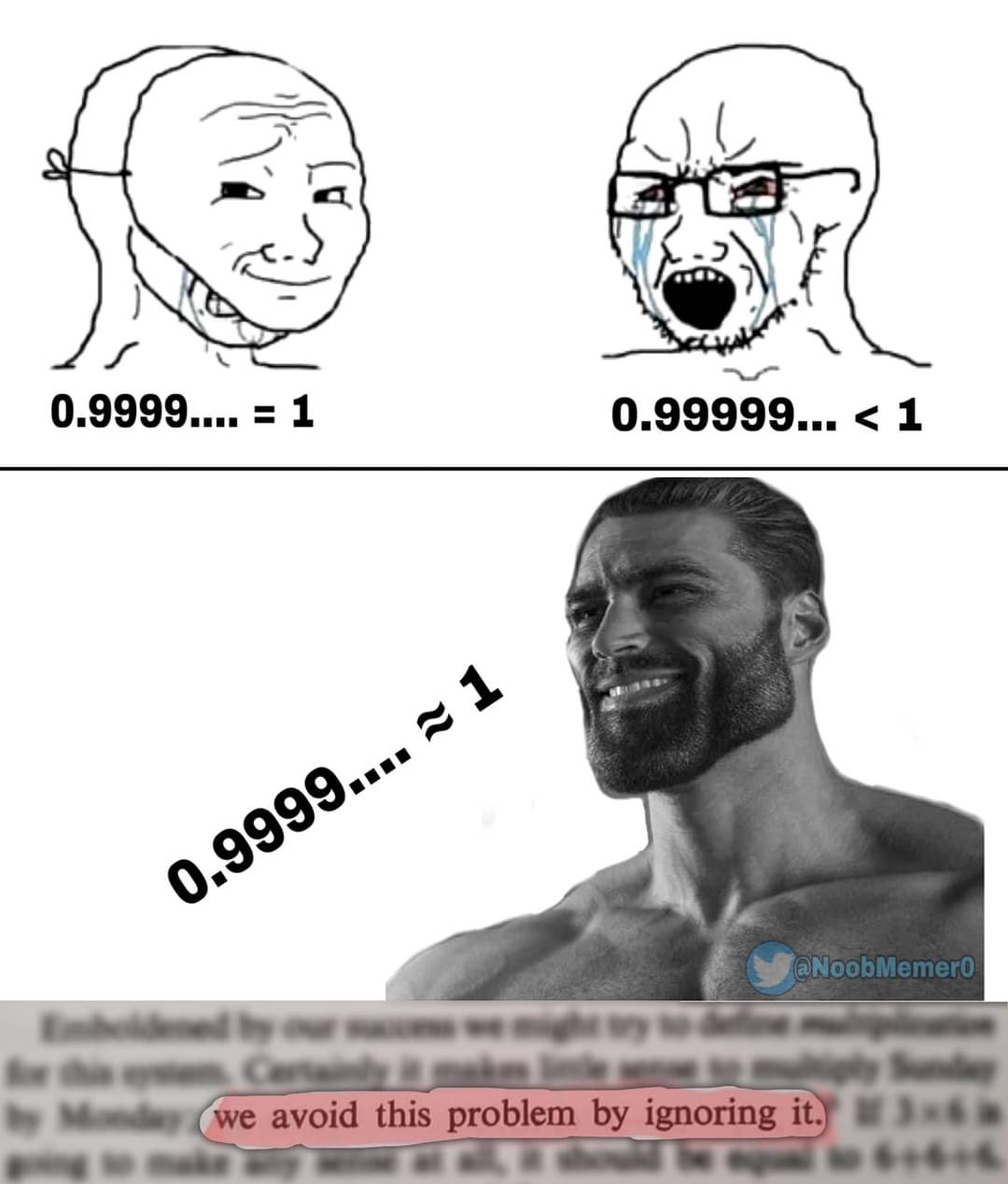this post was submitted on 27 Jun 2024
802 points (95.2% liked)
Science Memes
16675 readers
2362 users here now
Welcome to c/science_memes @ Mander.xyz!
A place for majestic STEMLORD peacocking, as well as memes about the realities of working in a lab.

Rules
- Don't throw mud. Behave like an intellectual and remember the human.
- Keep it rooted (on topic).
- No spam.
- Infographics welcome, get schooled.
This is a science community. We use the Dawkins definition of meme.
Research Committee
Other Mander Communities
Science and Research
Biology and Life Sciences
- !abiogenesis@mander.xyz
- !animal-behavior@mander.xyz
- !anthropology@mander.xyz
- !arachnology@mander.xyz
- !balconygardening@slrpnk.net
- !biodiversity@mander.xyz
- !biology@mander.xyz
- !biophysics@mander.xyz
- !botany@mander.xyz
- !ecology@mander.xyz
- !entomology@mander.xyz
- !fermentation@mander.xyz
- !herpetology@mander.xyz
- !houseplants@mander.xyz
- !medicine@mander.xyz
- !microscopy@mander.xyz
- !mycology@mander.xyz
- !nudibranchs@mander.xyz
- !nutrition@mander.xyz
- !palaeoecology@mander.xyz
- !palaeontology@mander.xyz
- !photosynthesis@mander.xyz
- !plantid@mander.xyz
- !plants@mander.xyz
- !reptiles and amphibians@mander.xyz
Physical Sciences
- !astronomy@mander.xyz
- !chemistry@mander.xyz
- !earthscience@mander.xyz
- !geography@mander.xyz
- !geospatial@mander.xyz
- !nuclear@mander.xyz
- !physics@mander.xyz
- !quantum-computing@mander.xyz
- !spectroscopy@mander.xyz
Humanities and Social Sciences
Practical and Applied Sciences
- !exercise-and sports-science@mander.xyz
- !gardening@mander.xyz
- !self sufficiency@mander.xyz
- !soilscience@slrpnk.net
- !terrariums@mander.xyz
- !timelapse@mander.xyz
Memes
Miscellaneous
founded 2 years ago
MODERATORS
you are viewing a single comment's thread
view the rest of the comments
view the rest of the comments

Unfortunately not an ideal proof.
It makes certain assumptions:
Similarly, I could prove that the number which consists of infinite 9's to the left of the decimal separator is equal to -1:
And while this is true for 10-adic numbers, it is certainly not true for the real numbers.
While I agree that my proof is blunt, yours doesn't prove that .999... is equal to -1. With your assumption, the infinite 9's behave like they're finite, adding the 0 to the end, and you forgot to move the decimal point in the beginning of the number when you multiplied by 10.
x=0.999...999
10x=9.999...990 assuming infinite decimals behave like finite ones.
Now x - 10x = 0.999...999 - 9.999...990
-9x = -9.000...009
x = 1.000...001
Thus, adding or subtracting the infinitesimal makes no difference, meaning it behaves like 0.
Edit: Having written all this I realised that you probably meant the infinitely large number consisting of only 9's, but with infinity you can't really prove anything like this. You can't have one infinite number being 10 times larger than another. It's like assuming division by 0 is well defined.
0a=0b, thus
a=b, meaning of course your ...999 can equal -1.
Edit again: what my proof shows is that even if you assume that .000...001≠0, doing regular algebra makes it behave like 0 anyway. Your proof shows that you can't to regular maths with infinite numbers, which wasn't in question. Infinity exists, the infinitesimal does not.
Yes, but similar flaws exist for your proof.
The algebraic proof that 0.999... = 1 must first prove why you can assign 0.999... to x.
My "proof" abuses algebraic notation like this - you cannot assign infinity to a variable. After that, regular algebraic rules become meaningless.
The proper proof would use the definition that the value of a limit approaching another value is exactly that value. For any epsilon > 0, 0.999.. will be within the epsilon environment of 1 (= the interval 1 ± epsilon), therefore 0.999... is 1.